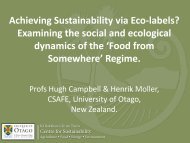Book of Abstract (incl. addendum) - IFSA symposium 2012
Book of Abstract (incl. addendum) - IFSA symposium 2012
Book of Abstract (incl. addendum) - IFSA symposium 2012
Create successful ePaper yourself
Turn your PDF publications into a flip-book with our unique Google optimized e-Paper software.
Workshop 1.3 Understanding agricultural structural changes and their impacts, to support<br />
<strong>incl</strong>usive policy dialogue and formulation<br />
This paper presents the methodological framework proposed by WAW based on a systemic<br />
approach (concentrating on relations between variables rather than on the sectoral variables) focused<br />
on the different forms <strong>of</strong> agricultural organization, their dynamics and contributions to sustainable<br />
development. It makes reference to existing tools or methodologies; notably an adaptation <strong>of</strong> the<br />
Sustainable Livelihoods framework and propose options to elaborate typologies <strong>of</strong> agricultural<br />
holdings and a core set <strong>of</strong> parameters and indicators to permit international comparisons. Continuous<br />
monitoring (as opposed to a one-time assessment), as well as projections <strong>of</strong> future paths, are key inputs<br />
in stakeholder evaluation <strong>of</strong> options during policy and planning processes, at different scales.<br />
DIALECTE, a comprehensive and rapid tool to assess the agroenvironmental<br />
performance <strong>of</strong> farms<br />
Philippe Pointereau, B. Langevin and M. Gimaret<br />
SOLAGRO, France<br />
Philippe.Pointereau@solagro.asso.fr<br />
Solagro has developed DIALECTE, a comprehensive, holistic and quick tool to assess the agroenvironmental<br />
performance and the ecological sustainability <strong>of</strong> farms. It is applicable to any type <strong>of</strong><br />
farming system in Europe. The tool was designed to help farmers identify scopes for improving the<br />
sustainability <strong>of</strong> agricultural production on their farms. DIALECTE’s rating system is based on the<br />
principles <strong>of</strong> agroecology, integrated production and organic farming: it favors diversified farming<br />
systems, high levels <strong>of</strong> biodiversity, systems that are adapted to local conditions, and the use <strong>of</strong><br />
abundant rather than rare resources. The tool calculates 43 agro-environmental indicators to produce (i)<br />
a farm-scale approach that assesses the farm’s diversity and the management <strong>of</strong> inputs, and (ii) an<br />
assessment <strong>of</strong> the potential impacts <strong>of</strong> the farm on water, soil, biodiversity and resource use.<br />
DIALECTE is freely accessible, available in several languages on the Internet<br />
(http://dialecte.solagro.org). A database allows sharing and comparison <strong>of</strong> the results.<br />
The methodology and three examples <strong>of</strong> DIALECTE’s implementation are presented. The value<br />
<strong>of</strong> using this kind <strong>of</strong> tools is discussed.<br />
Impact on erosive run<strong>of</strong>f and costs for local communities <strong>of</strong> usage scenarios<br />
<strong>of</strong> agricultural soils: the case <strong>of</strong> Pays de Caux (France)<br />
P. Martin, C. Ronfort, D. Laroutis, V. Souchère and C. Sebillotte<br />
AgroParisTech, France<br />
Philippe.Martin@agroparistech.fr<br />
Recurring mudflows in the silty areas <strong>of</strong> North-West Europe and particularly in Pays de Caux (France)<br />
result in significant costs for local communities. These flows result from erosion processes which occur<br />
on agricultural land located upstream <strong>of</strong> urban areas. Farming practices depend on changes in external<br />
factors (prices, regulatory system) that may lead to an increase in erosion and mudflows issues. Publicaction<br />
programs can limit the possible damage <strong>of</strong> these changes but any strengthening <strong>of</strong> these policies<br />
(compensation for farmers) induces costs for the community. Our goal is to examine the economic<br />
feasibility <strong>of</strong> action programs designed to counter some agricultural scenarios driven by changing<br />
external factors. To do so, we compared the cost <strong>of</strong> compensating farmers with the local populations’<br />
willingness to pay (WTP). We built scenarios <strong>of</strong> changes in farming systems with a 2015 horizon at the<br />
scale <strong>of</strong> the Pays de Caux, 2007 being the initial situation. We chose two scenarios <strong>of</strong> the<br />
disappearance <strong>of</strong> dairy farming, since local stakeholders were concerned with the future <strong>of</strong> local<br />
livestock farming and particularly by trends <strong>of</strong> declining dairy farming. One scenario (StopMilk) did<br />
not <strong>incl</strong>ude any public-action program, the other one (StopMilkEnv) involved a program based on the<br />
funding <strong>of</strong> environmental-friendly cultivation techniques . These scenarios were assessed at the small<br />
36











